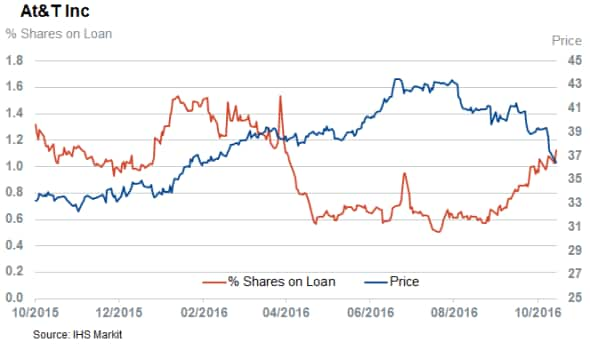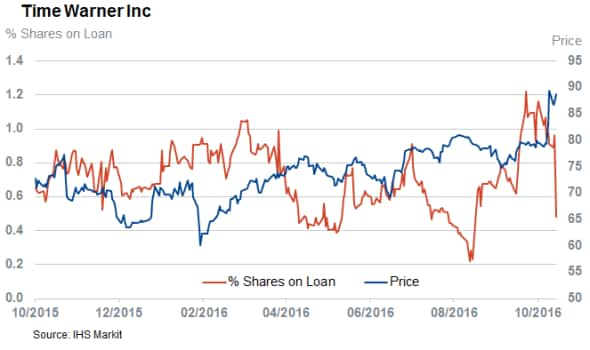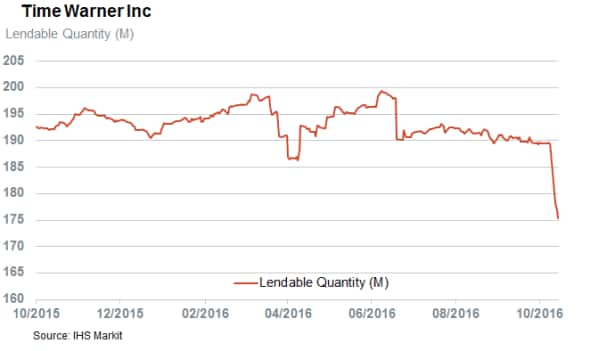Customer Logins
Obtain the data you need to make the most informed decisions by accessing our extensive portfolio of information, analytics, and expertise. Sign in to the product or service center of your choice.
Customer Logins
EQUITIES COMMENTARY
Nov 01, 2016
Short selling arbs sit out AT&T-Time Warner deal
Short sellers are showing little appetite to take advantage of the large spread remaining in the At&T Time Warner tie-up.
- AT&T borrow roughly flat at 1.2% of shares outstanding in wake of tie up announcement
- Time Warner short interest falls 75% post announcement
- 8% of Time Warner shares in lending programs have fallen out
The large discrepancy between the price agreed by US telecoms giant AT&T to purchase media conglomerate Time Warner Inc ought to see arbitrageurs jump on the chance to take lock in the 21% spread that they stand to make by shorting AT&T shares and buying shares in the target firm. While demand to borrow AT&T shares has increased by 10% in the last week, the securities lending market shows that appetite from short sellers a week on from the deal’s announcement has been mute so far as the current borrow only represents 1.2% of the AT&T shares outstanding. This borrow represents less than a tenth of the 14.4-15.7% that Time Warner shareholders stand to control post-merger.

The fact that the share portion of the transaction is fixed by value, as opposed to fixed shares, complicates things somewhat for arbitrageurs as Time Warner shareholders stand to receive between 1.43 and 1.3 AT&T shares on top of $53.75 in cash depending on whether the latter’s price where the latter settles between $37.4 and $41.35 at the deal’s completion. Despite this complication, arbitrageurs still stand to make over 16% in the worst case scenario were they to lock in the spread at the current $36.5 level, which would entitle them to 1.43 AT&T shares.
This continued reticence from investors looking to lock in the spread thorough long short arbitrage speaks to the continued political and regulatory uncertainty which has made the deal such a hot topic since its announcement last weekend. Faced with a potentially long and fraught journey ahead, we are seeing arbitrageurs opting for the wait and see approach before fully committing to the trade despite the juicy 16% yield offered by even the worst case scenario spread.
Time Warner
The lack of faith in the deal’s ultimate consummation isn’t evidenced on the other leg of the trade either as short sellers are showing no appetite to short Time Warner shares after their 11% surge from the pre-merger level. Far from shorting the rally, short sellers are heading for cover as the demand to borrow Time Warner Inc shares has fallen by over 75% in the last week to match the recent multi year lows set back in August.

Institutional investors who are willing to lend their Time Warner shares are also choosing to cash out, as the proportion of Time Warner shares in lending programs has fallen by 8% in since the deal was announced. This disappearing act would indicate that a portion of Time Warner’s current shares holder base is choosing to cash out following the rally rather than wait for the outcome political and regulatory process ahead.

S&P Global provides industry-leading data, software and technology platforms and managed services to tackle some of the most difficult challenges in financial markets. We help our customers better understand complicated markets, reduce risk, operate more efficiently and comply with financial regulation.
This article was published by S&P Global Market Intelligence and not by S&P Global Ratings, which is a separately managed division of S&P Global.
{"items" : [
{"name":"share","enabled":true,"desc":"<strong>Share</strong>","mobdesc":"Share","options":[ {"name":"facebook","url":"https://www.facebook.com/sharer.php?u=http%3a%2f%2fwww.spglobal.com%2fmarketintelligence%2fen%2fmi%2fresearch-analysis%2f01112016-Equities-Short-selling-arbs-sit-out-AT-T-Time-Warner-deal.html","enabled":true},{"name":"twitter","url":"https://twitter.com/intent/tweet?url=http%3a%2f%2fwww.spglobal.com%2fmarketintelligence%2fen%2fmi%2fresearch-analysis%2f01112016-Equities-Short-selling-arbs-sit-out-AT-T-Time-Warner-deal.html&text=+Short+selling+arbs+sit+out+AT%26T-Time+Warner+deal","enabled":true},{"name":"linkedin","url":"https://www.linkedin.com/sharing/share-offsite/?url=http%3a%2f%2fwww.spglobal.com%2fmarketintelligence%2fen%2fmi%2fresearch-analysis%2f01112016-Equities-Short-selling-arbs-sit-out-AT-T-Time-Warner-deal.html","enabled":true},{"name":"email","url":"?subject= Short selling arbs sit out AT&T-Time Warner deal&body=http%3a%2f%2fwww.spglobal.com%2fmarketintelligence%2fen%2fmi%2fresearch-analysis%2f01112016-Equities-Short-selling-arbs-sit-out-AT-T-Time-Warner-deal.html","enabled":true},{"name":"whatsapp","url":"https://api.whatsapp.com/send?text=+Short+selling+arbs+sit+out+AT%26T-Time+Warner+deal http%3a%2f%2fwww.spglobal.com%2fmarketintelligence%2fen%2fmi%2fresearch-analysis%2f01112016-Equities-Short-selling-arbs-sit-out-AT-T-Time-Warner-deal.html","enabled":true}]}, {"name":"rtt","enabled":true,"mobdesc":"Top"}
]}



